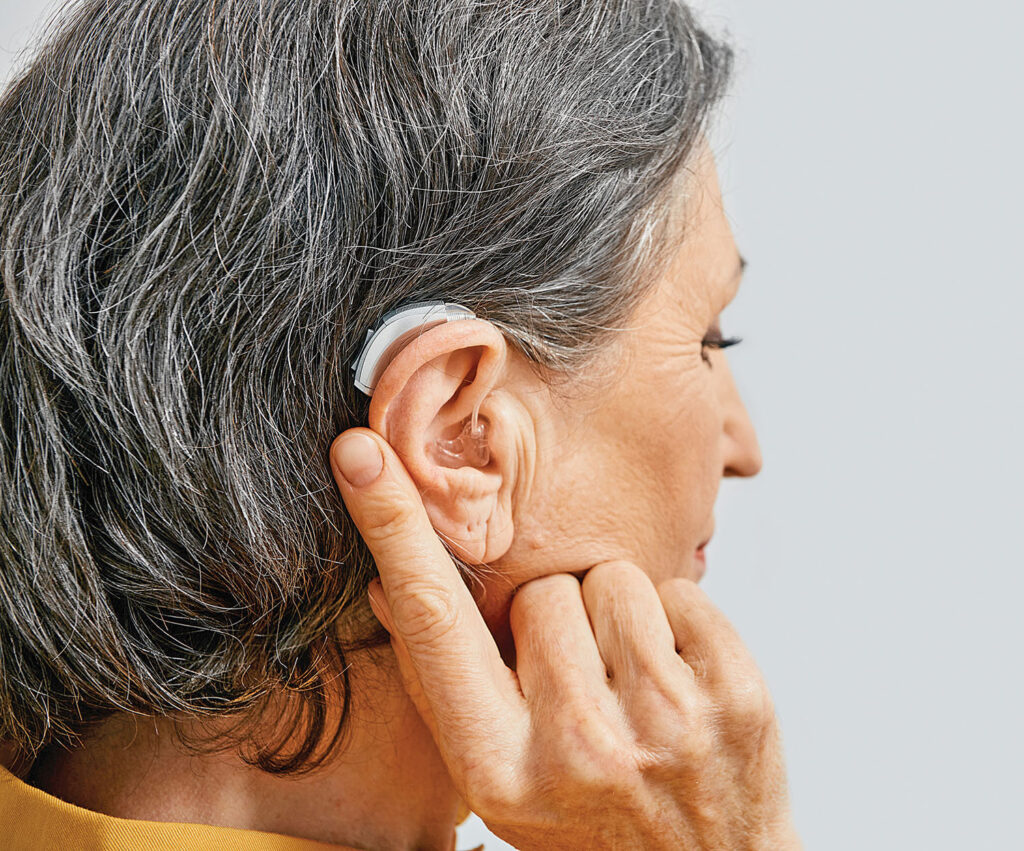
Exciting new research presented in The Lancet Healthy Longevity delivers promising news: individuals who use their hearing aids regularly might enjoy a significant boost to their lifespan! A 24% reduction in mortality risk is no small feat, and this study outlines the impressive potential benefits of staying on top of one’s auditory health.
Although caution is advised — correlation isn’t causation — the study’s lead researcher Janet Choi, MD, from Keck Medicine of USC, shares an upbeat perspective with Health. Dr. Choi underscores the importance of further investigation but remains hopeful about the study’s implications. It’s an encouraging indicator that hearing aids might have a protective effect that extends beyond simply improving hearing.
So as the science unfolds, it’s an exhilarating time for individuals to explore the multitude of hearing solutions available. Could hearing aids unlock a fuller, potentially longer life? It’s a bright possibility worth listening to!
How Wearing Hearing Aids May Contribute to Longevity
The human body is a remarkable system that relies on the interconnectedness of physical, mental, and emotional health. Among these connections, the sense of hearing plays a critical role in overall well-being. In recent years, studies have suggested there may be a link between hearing aid usage and increased longevity. This article explores the potential benefits of correcting hearing loss with hearing aids and how it could contribute to a longer life.
The Impact of Hearing Loss
Hearing loss can have far-reaching implications on an individual’s quality of life. It can:
- Lead to social isolation due to difficulties in communication.
- Increase the risk of cognitive decline and dementia.
- Cause balance issues, leading to falls and other physical injuries.
- Trigger feelings of depression and anxiety.
Hearing Aids as a Solution
Hearing aids are designed to alleviate the effects of hearing loss by amplifying sounds, making it easier for the wearer to engage in conversations and stay connected with their environment. When individuals can hear better, they can maintain a more active and engaged lifestyle, which is essential for healthy aging.
Cognitive Benefits
By wearing hearing aids, people with hearing loss can significantly reduce their risk of cognitive decline. Research has shown that untreated hearing loss accelerates atrophy in auditory areas of the brain, making it more challenging for the brain to process sounds and leading to increased cognitive load. With the assistance of hearing aids, the auditory stimuli remain active, which may help in maintaining better brain function.
Emotional and Social Advantages
Hearing aids can help decrease the risks of social isolation by enabling people to participate more fully in conversations and interactions, which are vital components of mental and emotional health. As social isolation is a known risk factor for mortality, staying connected can have direct implications for longevity.
Physical Health Connections
Improved hearing can translate to better balance and spatial awareness, reducing the likelihood of falls and accidents. By using hearing aids, older adults in particular may experience fewer hospitalizations and physical injuries.
A Gateway to Healthier Lifestyles
When individuals with hearing loss use hearing aids, they often regain the confidence to pursue hobbies and activities that they might have avoided due to their hearing issues. This leads to an increase in physical activity and cognitive engagement, both of which are associated with a longer and healthier life.
Lifespan Considerations
While hearing aids offer numerous benefits that can contribute to a more active and healthier lifestyle, they should be part of a broader health maintenance plan. Regular exercise, a balanced diet, social engagement, and mental stimulation are all critical factors that play a role in longevity.
Although there is no guarantee that wearing hearing aids will extend one’s lifespan, they provide a multitude of benefits that can improve the quality of life and may contribute to living longer. By addressing hearing loss with hearing aids, individuals can reduce the risk of cognitive decline, stay socially connected, maintain better physical health, and lead richer, more fulfilling lives, all of which are ingredients for aging gracefully.
As with any medical device, it’s essential to consult with a healthcare professional to determine if hearing aids are the right choice and to ensure they are properly fitted and utilized for maximum benefit.
Understanding the Comprehensive Impact of Hearing Loss on Health and Well-being
Hearing loss is an issue that affects millions of people across the globe. It’s not just an inconvenience; it can have profound implications for an individual’s overall health and well-being. As a silent epidemic, it gradually strips away the ability to communicate effectively, leading to a cascade of secondary health issues.
Psychological and Emotional Effects
The ability to hear clearly is intrinsically linked to our emotional and social health. Individuals with hearing loss often report feelings of isolation as they struggle to participate in conversations, potentially missing out on important personal connections. This social withdrawal can, in turn, lead to:
- Depression and anxiety
- Low self-esteem
- Increased stress
Cognitive Decline and Dementia
Recent studies indicate that untreated hearing loss might increase the risk of cognitive decline. When the brain receives less auditory stimulation, it may lack the necessary engagement to maintain its sharpness, potentially leading to:
- A faster decline in cognitive abilities
- An increased risk of developing dementia or Alzheimer’s disease
Safety Concerns
Hearing is a crucial sense for detecting danger in our environment. People with hearing impairment may not:
- Hear alarms, car horns, or other emergency signals
- Detect approaching vehicles or other hazards while walking or driving
- Notice important public announcements or calls for help
Physical Health Issues
There is a bidirectional relationship between hearing loss and physical health. For instance:
- Balance issues and a higher risk of falls and injuries
- Potentially higher rates of heart disease
- Tinnitus, which can be both a symptom and a catalyst for further hearing degradation
Workplace Challenges
In the workplace, hearing loss can affect productivity and job performance. Employees with hearing impairments might experience:
- Difficulty in understanding verbal instructions
- Challenges in participating in meetings and social functions with coworkers
- Increased fatigue due to straining to hear, which can lead to lower job satisfaction and higher risk of accidents
Relationship Strain
Hearing loss doesn’t only impact the individual; it also affects their loved ones. Communication barriers can strain relationships, causing:
- Frustration on both sides
- Misunderstandings that can lead to conflicts
- A decrease in shared social activities
Addressing Hearing Loss
It’s crucial for those experiencing signs of hearing loss to seek professional help. Early intervention may mitigate some of the negative outcomes associated with hearing impairment. Options include:
- Hearing aids and assistive listening devices
- Cochlear implants for more severe cases
- Regular check-ups with an audiologist
While the progression of hearing loss varies by individual, its impact is undeniably profound. By addressing hearing loss head-on and offering support for those who suffer from it, we can greatly improve the quality of life for affected individuals and their families, and reduce the associated health risks.
Encouraging awareness and seeking timely treatment can lead to a vastly improved outcome, fostering a society that is more inclusive and supportive of those with hearing challenges.
How to Get Help for Hearing Loss
If you or someone you know is experiencing hearing loss, taking steps to address it is crucial for maintaining quality of life and overall well-being. Here’s a guide on how to seek help and the options available:
Step 1: Recognize the Signs
Identifying hearing loss can be the first challenge. Common signs include:
- Difficulty understanding conversations, especially in noisy environments
- Frequently asking others to repeat themselves
- Turning up the volume on the TV or radio higher than usual
- Ringing in the ears (tinnitus)
- Withdrawal from social situations
Step 2: Visit a Healthcare Professional
Schedule a visit with your primary care doctor. They can rule out any underlying conditions that may cause hearing loss, such as infections or earwax buildup.
Step 3: Get a Hearing Test
Your doctor may refer you to an audiologist, a specialist who can conduct a comprehensive hearing test, called an audiogram, to assess the extent of hearing loss.
Step 4: Explore Hearing Aids
If hearing loss is confirmed, one common solution is hearing aids. An audiologist can recommend devices suitable for your hearing needs and lifestyle. Modern hearing aids are discreet and come with various features such as wireless connectivity.
Step 5: Consider Assistive Devices
In addition to hearing aids, there are other devices to improve hearing, like amplified phones, television listening systems, and alerting devices.
Step 6: Evaluate Other Medical Options
For more severe hearing loss, medical or surgical options such as cochlear implants may be considered. Discuss these options with an audiologist or an ear, nose, and throat specialist.
Step 7: Make Lifestyle Adjustments
Making minor changes in your daily life can also help, such as reducing background noise and choosing seating arrangements in public places that help you hear better.
Step 8: Communication Strategies
Learn and share strategies with friends and family that make communication easier, such as facing the person while talking and speaking clearly.
Step 9: Regular Check-ups
Regular follow-ups with your audiologist are essential to adjust hearing aids and monitor any changes in your hearing.
Step 10: Join a Support Group
Consider joining a support group for individuals with hearing loss to share experiences and learn from others.
Step 11: Stay Informed
Keep abreast of the latest advancements in hearing technology and treatment options that may benefit your situation.
Addressing hearing loss can significantly enhance the quality of life. Early intervention, appropriate aids and devices, and consistent care can help mitigate the impacts of hearing loss and improve communication. If you suspect a hearing issue, take action immediately to ensure the best possible outcome.



